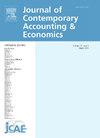The unintended consequences of targeted poverty alleviation: Evidence from China
IF 2.9
3区 管理学
Q2 BUSINESS, FINANCE
引用次数: 0
Abstract
This study examines the effect of corporate targeted poverty alleviation (TPA) activities endorsed by Chinese governments on audit outcomes. We find that firms engaging in TPA activities are less likely to receive modified audit opinions (MAOs) relative to those without TPA activities and more TPA investments induce less MAO issuance, documenting an unintentional beneficial consequence of TPA. These findings are robust to a battery of sensitivity tests, including addressing endogeneity issues and ruling out the alternative explanation. Our cross-sectional results show that the negative relation between TPA and MAOs is more significant for firms audited by non-industry specialists and short-tenure auditors, non-state-owned enterprises (non-SOEs), and labor-intensive firms. We perform the mediation analyses and identify three potential channels- improved operating performance, enhanced information disclosure quality, and elevated reputation- through which TPA engagements influence the likelihood of receiving MAOs. Moreover, we find industrial development TPA has a more pronounced effect on audit outcomes due to its positive impact on firms’ business operations. Overall, our research documents an unintended consequence of firms’ TPA initiatives in mitigating audit risk. As a vital facet of policy-oriented CSR, TPA engagements exhibit unique characteristics compared to other CSR perspectives. Given its economic relevance and political features, our study contributes to this stream of research and offers implications for TPA initiatives.
精准扶贫的意外后果:来自中国的证据
本研究考察了中国政府支持的企业定向扶贫(TPA)活动对审计结果的影响。我们发现,与没有TPA活动的公司相比,参与TPA活动的公司收到修改审计意见(MAOs)的可能性更小,并且更多的TPA投资导致更少的MAO发行,这证明了TPA的一个无意的有益后果。这些发现在一系列敏感性测试中是稳健的,包括解决内生性问题和排除其他解释。我们的横断面研究结果表明,在由非行业专家和短期审计师审计的企业、非国有企业和劳动密集型企业中,TPA与MAOs的负相关关系更为显著。我们进行了中介分析,并确定了三个潜在的渠道——改善经营绩效、提高信息披露质量和提高声誉——通过这些渠道,TPA参与影响了接收mao的可能性。此外,我们发现工业发展贸易促进权对审计结果的影响更为显著,因为它对企业的业务运营有积极的影响。总体而言,我们的研究记录了公司TPA举措在减轻审计风险方面的意外后果。作为政策导向企业社会责任的一个重要方面,与其他企业社会责任观点相比,贸易促进权的参与表现出独特的特点。鉴于其经济相关性和政治特征,我们的研究有助于这一研究流,并为TPA倡议提供启示。
本文章由计算机程序翻译,如有差异,请以英文原文为准。
求助全文
约1分钟内获得全文
求助全文

 求助内容:
求助内容: 应助结果提醒方式:
应助结果提醒方式:


